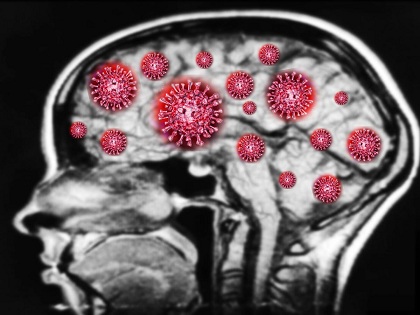Viral Persistence: Georgia State University Study Indicates That SARS-CoV-2 May Hide In The Brain And Cause Relapses In ‘Recovered’ Patients!
Source: Viral Persistence Jan 22, 2021 5 years, 1 week, 5 days, 19 hours, 46 minutes ago
Viral Persistence: A new research by scientists from the Georgia State University involving animal models has demonstrated that mice being infected with the SARS-Cov-2 coronavirus through their nasal passages developed severe illness due to brain infection even after the virus had left their lungs. The implications of the study findings suggest viral persistence in individuals despite testing negative via typical nasal swabs or saliva COVID-19 tests and being deemed as recovering or recovered.

SARS-CoV-2 infection can cause neurological disease in humans, but little is known about the pathogenesis of SARS-CoV-2 infection in the central nervous system (CNS). Herein, using K18-hACE2 mice, the study demonstrated that SARS-CoV-2 neuroinvasion and encephalitis is associated with mortality in these mice. Intranasal infection of K18-hACE2 mice with 105 plaque-forming units of SARS-CoV-2 resulted in 100% mortality by day 6 after infection. The highest virus titers in the lungs were observed on day 3 and declined on days 5 and 6 after infection. By contrast, very high levels of infectious virus were uniformly detected in the brains of all the animals on days 5 and 6. Onset of severe disease in infected mice correlated with peak viral levels in the brain. SARS-CoV-2-infected mice exhibited encephalitis hallmarks characterized by production of cytokines and chemokines, leukocyte infiltration, hemorrhage and neuronal cell death. SARS-CoV-2 was also found to productively infect cells within the nasal turbinate, eye and olfactory bulb, suggesting SARS-CoV-2 entry into the brain by this route after intranasal infection.
The study findings indicate that direct infection of CNS cells together with the induced inflammatory response in the brain resulted in the severe disease observed in SARS-CoV-2-infected K18-hACE2 mice.
The study findings were published in the peer reviewed journal:
Viruses.
https://www.mdpi.com/1999-4915/13/1/132/htm
The study team found that mice infected with the virus through their nasal passages developed severe illness due to brain infection even after the virus had left their lungs. Lead researcher and study co-author Dr Mukesh Kumar suggested that the findings could explain why human patients who appear to be nearly over the illness sometimes quickly relapse and die.
Dr Kumar told Thailand Medical News, "The brain is one of the regions where virus likes to hide. That's why we're seeing severe disease and all these multiple symptoms like heart disease, stroke and all these long-haulers with loss of smell, loss of taste. All of this has to do with the brain rather than with the lungs."
The research also found that the SARS-CoV-2 coronavirus was located in the brains of mice at a level 1,000 times higher than any other area of the body.
Although levels of the virus located in the lungs began to diminish after three days of infection, the virus remained at high levels in the brain on the fifth and sixth days, when the course of the disease became more severe.
Dr Kumar added, "Our thinking that it's more of a respiratory disease is not necessarily true. Once it infects the brain it can affect anything because the brain is controlling your lungs, the heart, everything. The
brain is a very sensitive organ. It's the central processor for everything."
Besides COVID-19, Dr Kumar suggests that the SARS-CoV-2 coronavirus reaching the brain could leave patients susceptible to other serious health issues in the future, including neurological conditions like Parkinson's Disease and Multiple Sclerosis, along with general cognitive decline and autoimmune diseases.
He warned, "It's scary. A lot of people think they got COVID and they recovered and now they're out of the woods. Now I feel like that's never going to be true. You may never be out of the woods."
Various neurological symptoms are known to be relatively common for individuals with COVID-19. However, while multiple studies have suggested that mice brains are susceptible to being infected by the virus, research has not produced proper conclusive evidence to support the notion that the virus infects and concentrates in human brains. Neurological symptoms could be caused by an immune response rather than a direct brain infection.
However a study, published in the
Journal of Experimental Medicine, had found evidence of the virus in the brains of three people who died from COVID-19 complications.
https://rupress.org/jem/article/218/3/e20202135/211674/Neuroinvasion-of-SARS-CoV-2-in-human-and-mouse?searchresult=1
Numerous other studies have also shown that he SAR-CoV-2 coronavirus is able to infect the brains of humans directly.
https://www.thelancet.com/journals/laneur/article/PIIS1474-4422(20)30308-2/fulltext
https://www.nature.com/articles/s41593-020-00758-5
https://www.the-scientist.com/news-opinion/sars-cov-2-can-infect-human-brain-organoids-67723
Clearly, more research is needed
. As we learn more about the many ways COVID-19 wreaks havoc on the body, understanding the neurological symptoms will be critical in helping people.
At the same time the issue of viral persistence needs to be addressed properly by the medical and research community with regards to so called ‘recovered’ SARS-CoV-2 infected individuals and also those with long COVID issues. Proper diagnostics and protocols along with follow up checkups need to be in place to assess the presence of viral persistence in such individuals.
An interesting study showed that about 3 percent of ‘recovered ‘COVID-19 patients still test positive for live and infectious SARS-CoV-2 coronavirus.
https://www.thailandmedical.news/news/coronavirus-news-study-alarmingly-shows-that-3-percent-of-recovered-covid-19-patients-test-positive-for-live-and-infectious-sars-cov-2-virus
Many experts are now in the view that the figures could be far much more higher as current diagnostics are not effective in detecting the SARS-CoV-2 coronavirus especially in tissues of the gastrointestinal tract, kidney and liver tissues, male testes, etc of ‘recovered’ individuals and an ordinary nasal swab or saliva tests is not the least effective.
For more on SARS-CoV-2
Viral Persistence, keep on logging to Thailand Medical news.
